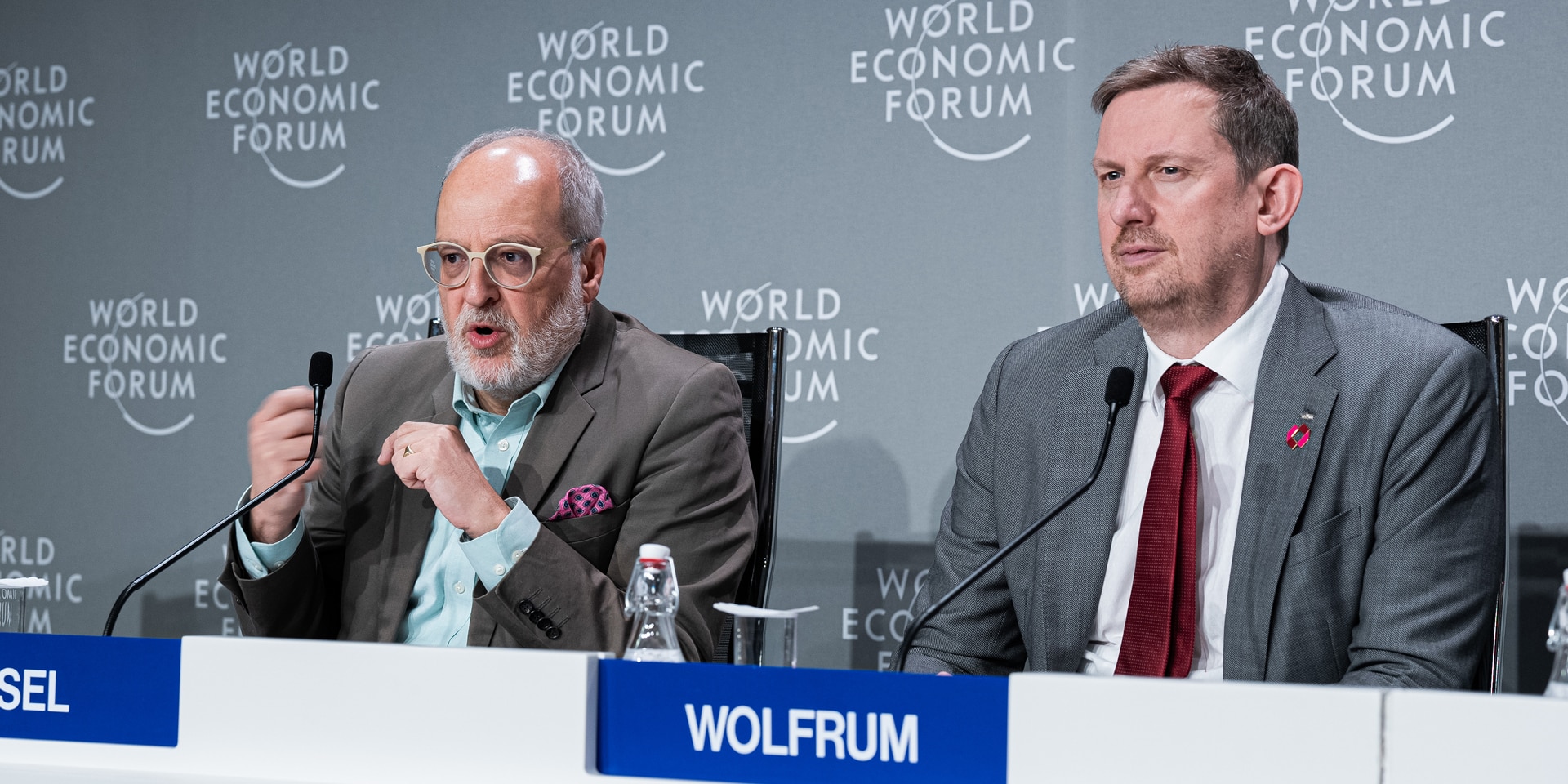Swiss Confederation at the heart of an initiative for global access to artificial intelligence
An initiative has been launched recently by the FDFA and the Swiss federal institutes of technology, in collaboration with several international partners, aimed at addressing global challenges with AI systems that are transparent and accessible to all.

FDFA State Secretary Alexandre Fasel and Christian Wolfrum, Vice President of ETH Zurich, at the launch of the ICAIN initiative during the WEF in Davos. © WEF
No, this article was not written with the aid of artificial intelligence, but the impact of this new technology is already evident. Whether at work, home, or leisure, AI is influencing our daily lives. This pivotal technology is transforming how our society operates, affecting the realms of business and politics. The Swiss Confederation is investing in this field, recognising its enormous potential, particularly in addressing global challenges such as climate change, pandemics and inequality. The latest initiative, launched at the World Economic Forum in Davos, is a collaboration between the Federal Department of Foreign Affairs (FDFA), ETH Zurich, and EPFL, along with international partners. It is named the 'International Computation and AI Network of Excellence' (ICAIN).
This Swiss initiative, led by the FDFA's Digitalisation Division, highlights Switzerland's prominent role in AI research and emphasises the importance of International Geneva in addressing AI issues for the greater good. "However, ICAIN has been an international project from the outset," stresses Alexandre Fasel, state secretary of the FDFA.
Reducing the digital divide
The initiative aims to develop AI technologies that are beneficial for humanity and the planet, accessible to all, and thus contribute to achieving the Sustainable Development Goals of the United Nations 2030 Agenda and reducing global inequalities. "Currently, not all countries have equal access to the resources needed to establish AI projects. If this does not change, the digital divide will widen, and with it, inequalities," says Fasel.
With the objectives it has set itself, ICAIN aims to reverse this trend. To achieve this, it can rely on the expertise of the top AI researchers in Europe and Africa. It also has access to two of the world's most advanced and powerful supercomputers. "This is what makes the ICAIN initiative unique. Without access to such capabilities, researchers, particularly in developing countries, are at a significant disadvantage. Thanks to ICAIN, we are closing this gap," notes Fasel.
For transparent AI
ICAIN, operating at the intersection of the public and private sectors, academia and civil society, has launched three pilot projects in collaboration with Data Science Africa. This pan-African organisation, which connects African data scientists and offers them training courses, aims to use AI to make agriculture more resilient to the adverse effects of climate change. "Global problems require global solutions. And African countries are grappling with challenges that we are also increasingly facing. The impact of climate change on agriculture is one such challenge. So the solutions developed in Africa to make agriculture more climate resilient can, where appropriate, assist farmers in other regions," explains Professor Christian Wolfrum, vice president for research at ETH Zurich.

In the interests of accessibility and inclusion, ICAIN will also support AI projects based on transparency and open source principles. "Everyone should be able to understand how and on what data the AI models were trained and how they arrived at their results," adds Professor Wolfrum.
Several pilot projects in the pipeline
Currently in its incubation phase, the initiative will finalise project selection criteria and governance issues in 2024. Several new pilot projects will also be launched, including a weather data quality assurance project. This will focus on using AI to ensure the quality of meteorological data, which is crucial for decision-making, particularly in agriculture, and can help make it more resilient to the negative effects of climate change.
A consistent digital foreign policy
The FDFA's Digitalisation Division coordinates the implementation of the Federal Council's Digital Foreign Policy Strategy 2021–24, which aims to ensure that Swiss interests in the digital space are represented in a coherent manner. Its priorities include strengthening International Geneva, particularly in its role as a centre for digital governance, and Switzerland's contribution to the search for innovative solutions in the field of AI governance. This approach is in keeping with the priorities set out in the Foreign Policy Strategy 2024–27, particularly the thematic priority of democracy and governance.
Links
- Competence Network for Artificial Intelligence, CNAI
- Artifical Intelligence, Federal Office for Communications
- Plateforme Tripartite for digital governance and artificial intelligence in Switzerland, OFCOM
- Artificial Intelligence, State Secretariat for Education, Research and Innovation
- Swiss approach to regulating AI systems
